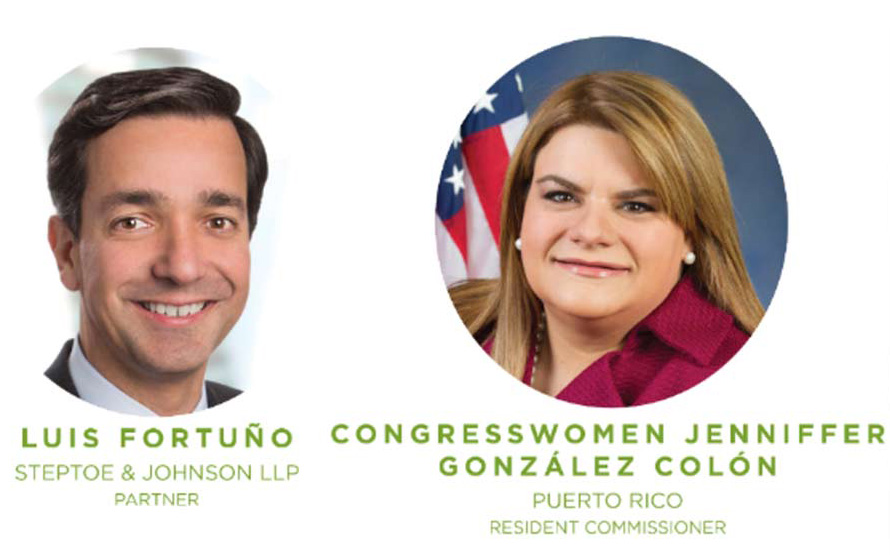¨.
The panelists :
- Congresswoman Jennifer Gonzalez Colon – Resident Commissioner Puerto Rico
- Luis Fortuno – Partner Steptoe & Johnson LLC & Former Governor Puerto Rico
- Adam Greenfader – Moderator and Principal AG&T
- Andy Carlson – SVP Country Manager Puerto Rico for JLL
- Kai Deusch – MD PhD Chairman & CEO Aphaia Pharma
- Noel Zamot – President Atabey Group
The ULI Webinar has an incredible array of information crammed into 90 minutes and it gives a great snapshot for the many initiatives being introduced and planned to help the Puerto Rican economy and create more quality jobs. If I had to some it up in three words, Mo is back. Mo of course being momentum.
Each of the speakers brought a different perspective. Congresswoman Gonzalez Colon noted her primary mission is the reconstruction of the Island and to shephard the many supporting bills recently introduced in the US Congress. Former Governor Luis Fortuno brought an informed Wash DC think tank perspective, Adam Greenfader is one of Puerto Rico´s most passionate advocates, Andy Carlson of JLL (Jones Lang LaSalle) brings experienced commercial insights from the world´s second largest public brokerage firm, Dr Deusch stated his case for the reasons he brought his Swiss/German manufacturing business to Puerto Rico because of a need for precision and reliability, while Noel Zamot has a finger on the ethical pulse of developing new business in Puerto Rico.
The conversations were upbeat and positive. For instance, Congresswoman Colon made a presentation on MMEDS which was introduced last month to Congress under the bill H.R. 7527. This bill provides tax incentives and tax credits for companies creating manufacturing plants and jobs in economically distressed areas in the US and its territories. The criteria for distressed is even stricter than the recent Opportunity Zone legislation passed in late 2017. When the Congresswoman showed the MMEDS qualifying maps there were smaller areas in very non desirable locations in the US whereas Puerto Rico literally had a much larger proportional area in some desirable locations. And she stated very clearly that MMEDS is one of the very few legislative items that is drawing bi-partisan support from both sides of the aisle.
The entire panel then weighed in on the competitive advantages that Puerto Rico has when competing with the mainland U.S. including much lower labor costs by as much as 60% lower in some cases, an experienced manufacturing labor force going back 100 years, the University of Puerto Rico at Mayaguez which is a top 10% engineering school for the entire U.S. and which is very much geared to provide the engineering and chemistry talent to support Puerto Rico´s manufacturing base. That even today five of the top ten selling drugs internationally are produced in Puerto Rico and 12 of the top 20 pharmaceutical companies have plants in Puerto Rico. Luis Fortuno noted that Puerto Rico had more than $40 billion USD in pharmaceutical exports in 2019 but has the capacity to increase this substantially. The panel noted that some closed down plants are almost in turnkey conditions should manufacturers wish to return or expand capacity. It would not take much. Maybe a recession of the Jones Act, or at least an exemption for an extended period of time, might be the necessary catalyst. There are some interesting new developments on this front as was evidenced last week by Hawaii noting that 85% of their informed populace is all for rescinding the Jones Act as it costs that Island 1.2 billion USD in additional transportation and cost of goods fees.
Progress is being made on seeking some type of exemption under the taxing provisions of GILTI as it adds a 10%+ tax on profits for CFCs (controlled foreign corporations) which unfortunately applies to the US territories since the do not fall under the IRC (Internal Revenue Code). On May 1, 2020, Congresswoman Stacey E. Plasket, representing the US Virgin Islands, filed Bill HR 6648 – the Territorial Economic Recovery Act, that if becomes law, it will exclude our territories from much or all of the GILTI taxation, under certain provisions.
On April 3, 2020, Congresswoman Jennifer González, resident Commissioner for Puerto Rico, introduced Bill HR 6643, the Securing National Supply Chain Act of 2020, to provide various tax credits to Economically Distressed Zones, including a tax credit on the amount of wages paid by an employer to employees in such a zone. The proposal has some overlap with HR 7527 noted above.
President Trump’s Special Representative for Puerto Rico’s Disaster Recovery, Rear Admiral Peter Brown, lead two delegations to Puerto Rico in August 2020, the last visit being last week. I am told the trip was very successful as a big priority was to visit and understand the many advantages of pharmaceutical manufacturing in Puerto Rico. AG&T is committed to bringing our network top information and access to our industry’s leaders.



